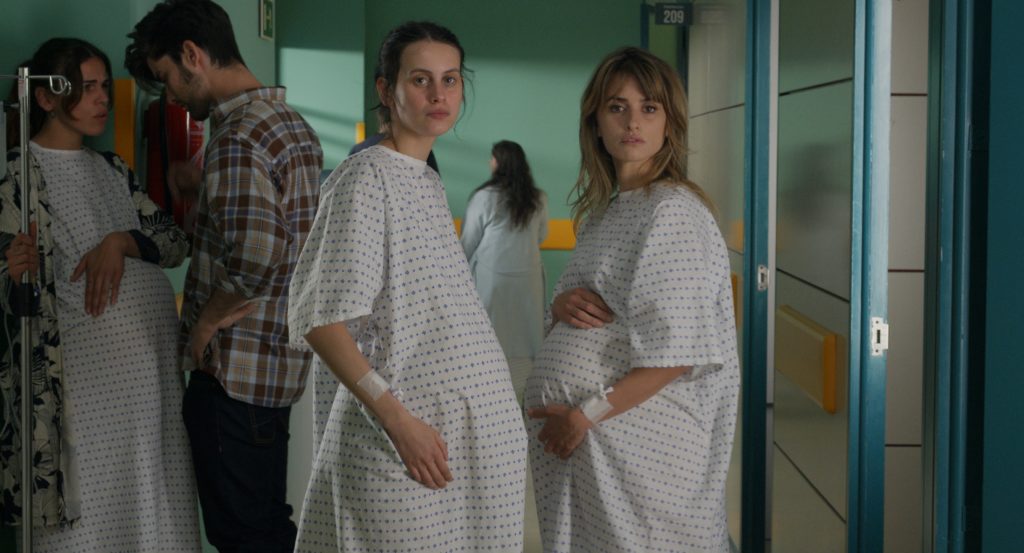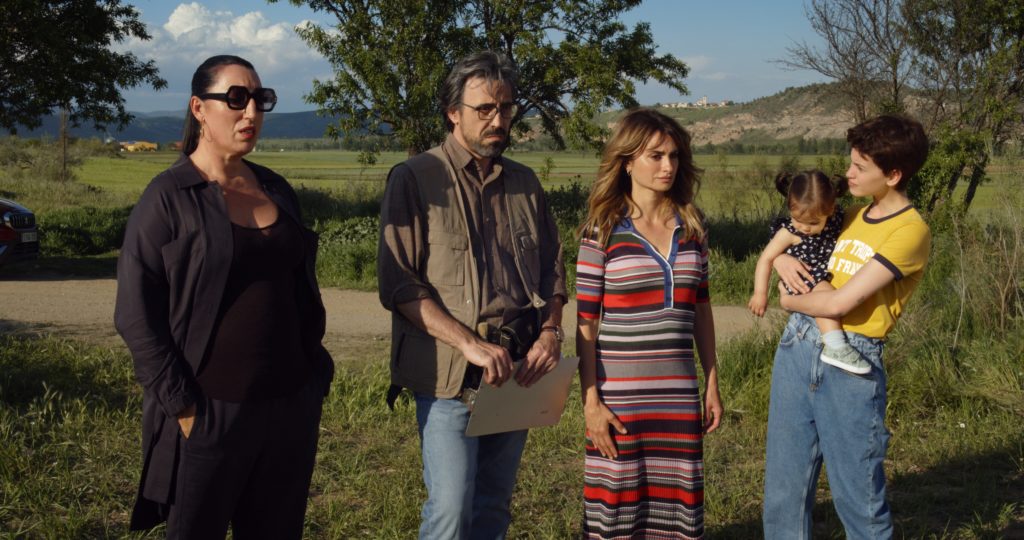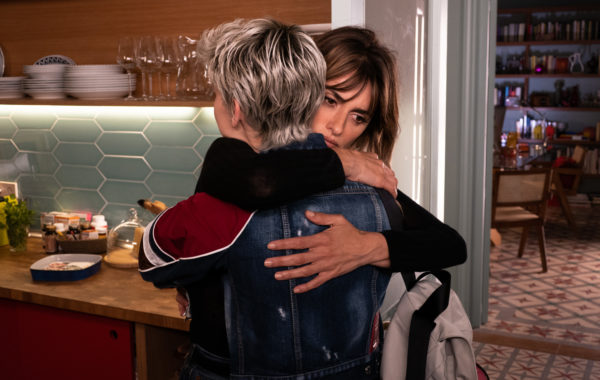Penelope Cruz is moments away from giving birth the first time she appears in a Pedro Almodóvar film, 1997’s Live Flesh. It’s a cold January night in Madrid—Christmas lights still dot the streets—at the dawn of a transitional decade for Spain, the 1970s. Social tensions abound as Franco’s dictatorship is tested. A title card informs the audience that the country has entered a state of emergency: Constitutional rights are suspended until further notice. This is a Spain in transition, even if its people aren’t fully aware of it. By the end of the decade, the country would abandon its dictatorship and tentatively enter into a new and untested democracy.
Cruz’s appearance in Live Flesh is limited to this brief opening sequence in which she is cast as a single mother who gives birth on a city bus en route to the hospital. The birth is covered by the local press as a miracle and the child a representation of a new, modern Spain. In Almodóvar’s films, childbirth, and motherhood in particular, is often treated as symbolic of the nation’s post-Franco cultural renewal. While Spain has been a democracy for slightly over 40 years, the historical scars left by the devastating toll of its Civil War (1936–39), and the fascist dictatorship that followed, feature prominently in Almodóvar’s films. His protagonists are often those who lived on the margins of Spanish society until the dawn of democracy, each of them exploring their own identity in the context of a country working to define its future while simultaneously grappling with its past.
At the heart of Almodóvar’s interest in motherhood is the idea of redefining—and reconstituting—the nuclear family away from the Catholic ideal championed during Franco’s regime. His families are inclusive, to the fullest extent of the word. If Almodóvar’s films fit uncomfortably into the popular notion of “Spain,” it’s only because of their insistence on challenging exactly the notion of what, or more appropriately who, Spanish culture means to include.
More generally, Almodóvar is grouped into the category of Queer cinema, a label so wide-reaching and vague that it is ultimately reductive. But there is no mistaking his work as anything but Spanish, even if his films can be found in cinemas around the world. Pedro Almodóvar is considered Spain’s most recognizable filmmaker of all time, alongside Luis Buñuel, an enemy of Franco’s regime and likewise an iconoclast. Almodóvar’s work engages with the social, cultural, and historical traumas of post–Civil War Spain. It addresses the repressed desires seeping through the cracks of Spanish Catholicism. His status as one of today’s most celebrated auteurs owes as much to this worldview as it does to his distinctive visual style, its Douglas Sirk–inspired, expressive mise-en-scène bursting with color.
All his films, in one way or another, return to the same themes. In the introduction to his book on the filmmaker, Ernesto Acevedo-Muñoz observes how Almodóvar explores Spain’s “questions of cultural anxiety” through characters often found on the margins of society (women and queer and transgender people) and their “obsessive attempts to rebuild or reconstitute the family.” Acevedo-Muñoz writes, “The essence of Almodóvar’s aesthetics has always been there: the desire to make logic out of chaos, and to rebuild the family and the nation out of its own fragmentation and the trauma of its past.”
In this context, Almodóvar’s latest film, Parallel Mothers, is a synthesis of some of the director’s best works. It marks his eighth collaboration with actress Penelope Cruz, who once again—as was the case in Live Flesh, All About My Mother (1999), and Volver (2006)—plays a maternal role. As Janis, Cruz’s protagonist is leading an inquiry into finding the remains of her great-grandfather, who disappeared during the Civil War, when she finds herself with an unexpected pregnancy, the result of an affair with a married man. She decides to raise the child alone. In the hospital, she crosses paths with the young Ana (Milena Smit), pregnant herself as a result of a rape by a classmate, who similarly decides to forge ahead alone with her child. Their lives as single mothers intertwine as Janis continues to press for answers regarding the remains of her grandfather. Parallel Mothers succeeds in balancing the domestic drama with the political film at its heart, this fluidity between different genres now one of the director’s trademarks.
“It’s always been something that concerns me, something I’m very sensitive to but could never come up with a story for or a way to work it into one of my existing stories,” Almodóvar tells Boxoffice Pro on the closing night of the film’s premiere at the New York Film Festival. “I work on my scripts in various stages, and during the stay-at-home orders, which was when I last revisited this story, I discovered I could connect this theme through one of the character’s grandparents. That connection through the generations closed the gap between the past and the present. Keep in mind that 75 years have already passed since that era; it was a long time ago. We spoke with some U.N. representatives who were in Spain to look at the mass grave sites. They told us they found it curious that in Spain it was the great-grandchildren’s generations that were the ones asking to unearth the sites. In all the places they had been—like Chile or Argentina—it had been the generations that immediately followed making those demands. In Spain, that effort has been led by the generations who were already born into democracy. The truth is that my country holds a very strange and uncomfortable relationship with its own past. That’s why I’ve always felt so strongly about exploring this subject in a film.
“In July 2021 they passed a new law, which wasn’t in place when we were filming, that addresses multiple issues. Namely, it puts the state in charge of the excavations and holds it fiscally responsible for doing so. The state will cover the costs and they’re expected to open all the mass grave sites they can find, which could number in the hundreds. According to some statistics, approximately 140,000 people remain unaccounted for. This law will finally pay that debt Spanish society has with its own people, the victims and their family members.”
Dating back to his earliest films, Almodóvar’s protagonists enter their respective stories with some level of trauma from their past. When it comes to female characters, Almodóvar can be criticized for over-relying on rape as a symbolic shorthand for a trauma caused by a patriarchal figure from their past. Father figures are largely absent in Almodóvar’s films, and on the rare occasion they do appear, they tend to hinder rather than help the characters’ progression. These patriarchal concerns are expressed in films like All About My Mother and Volver, movies that reconfigure the nuclear family in homes and communities dominated by a multigenerational group of women—without any involvement whatsoever from men.
These themes are all present in the domestic melodrama of Parallel Mothers. “I tend to tell stories about mothers looking for a family,” admits Almodóvar. “With Parallel Mothers, the two women at the heart of the film are both orphans and single mothers. What I propose in these movies is that the family structure has changed enormously over the last 20 years. In Spain, the concept of family was inextricably linked to the Catholic ideal of the family; it always had that religious undertone. That’s far from being the reality of today. Families no longer need to have a religious dimension. They are structured through the love and care for their children rather than any sort of duty to the Church. In these movies I advocate for very inclusive families motivated by love. Families made up of single mothers, two fathers, or two mothers. The concept of family has progressed a lot in recent years. In this movie, the family I bring together is initially made up of two single mothers, and it expands to include a [straight] man and another child. It is an open family where genders still exist but don’t serve the same function they had in the traditional Catholic sense.”

Almodóvar claims to be drawn to family narratives because of his own upbringing. “I was born to a humble family during a very difficult time, the 1950s, during the postwar period,” he says. “My parents’ obsession was for me to find a stable job that could provide a secure future, the type of life they couldn’t achieve on their own because of the war. Suffice to say, I was never interested in that sort of stability,” he says, laughing, “I was looking for something totally different. But I’ve always had those parental concerns in the back of my mind, that drive from parents to provide a better future for their children. Although I never followed the path my parents wanted me to, I still have those feelings in my mind.”
It is a provincial perspective, in the geographical sense of the word. Pedro Almodóvar was born in a rural town in the province of Castille-La Mancha, where he spent the first eight years of his life before leaving for boarding school. Despite his rustic roots, he is more closely associated with Madrid, where he shot to stardom as part of the city’s vibrant art scene in the 1980s. The protagonists of his films occasionally share similar backgrounds, a contemporary urban identity with a longing for the simplicity of their rural childhoods. That longing for a return to the village is the titular theme of Volver and has played a prominent role in several of his films, including 2019’s Pain and Glory.
“My characters, including Janis in Parallel Mothers, tend to come from a rural background before establishing themselves in a city in search of a better life. That is something that has deeply marked my life, belonging to these two cultures: the urban and the rural,” he says. “I am a very urban person, but I have a lot of memories of living in the town, even if I only lived there for eight years. That nostalgia was always present for older folks like my mother. She moved to Madrid to live with my sisters during the last years of her life, but people from her generation were never able to adapt to city life. The villagewas a sort of Eden for them, even though it was an incredibly difficult place for them when they were younger. I have fond memories of that enormous nostalgia she always felt for her roots. I share those roots. I also feel like someone from La Mancha—even if I don’t share that same level of yearning to return.”

The generational divide in Spain has been a recurring theme since Almodóvar’s earliest films. Titles like his 1980 debut feature Pepi, Luci, Bom y otras chicas del montón exude a youthful, transgressive energy in their defiance of Franco’s Spain during its transition to democracy. The portrayal of that generation gap in his films evolved as Spain’s democracy continued to develop over the years. By 1999’s All About My Mother, Almodóvar’s work embraced a more reconciliatory tone when exploring Spanish identity across generations. His films have never ceased to shock, but they have become notably less interested in provoking viewers for provocation’s sake. Films like 2006’s Volver explicitly sought to link several generations of Spanish women through their shared trauma as survivors of sexual violence. In Parallel Mothers that motif of cross-generational motherhood and family returns, this time willing to ask pointed questions about each generation’s responsibility to understand their past.
In this film, Ana’s character “is the product of a very conservative education,” says the director. “Spain has always been a very divided country, and it remains one to this day. The younger generations have their own set of problems, but what I try to explore in Parallel Mothers is that young people have a responsibility to look back and understand their past. We had to make a lot of concessions in our transition to democracy, concessions that led to the Pact of Forgetting [an amnesty gesture by Spain’s political parties in the immediate aftermath of Franco’s death]. That is why the exhumation of these mass grave sites has been forgotten for so long. It was such a sensitive topic in those days because you still had a lot of people in government who were franquistas [Francoists].”
As we near the end of our conversation, Pedro Almodóvar pauses to collect his thoughts, as if he’s trying to succinctly express what he’s been trying to say. Finally, he sums it up through his film: “The best way to explain it, there is a line in Parallel Mothers, in a tense scene between Janis and Ana, where Janis tells her in a somewhat pedagogic manner, ‘You need to know what type of country you live in, and what type of country your parents and grandparents lived in.’”



Share this post